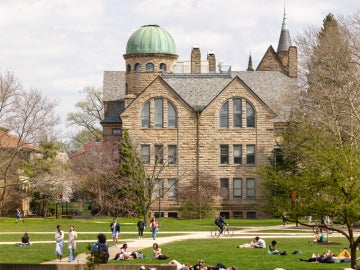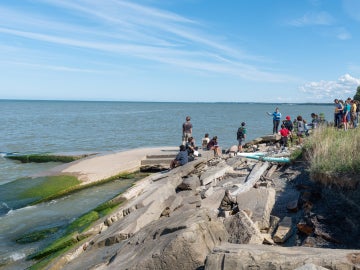Advocating for Undocumented Immigrants: Joanne Lee ’15
March 16, 2020
Jaimie Yue ’22

Joanne Lee ‘15 being sworn in as an immigration attorney for Gulfcoast Legal Services in St. Petersburg, Florida.
Photo credit: Courtesy of Joanne Lee
An English major at Oberlin, Lee discovered her calling to be an immigration attorney at Yale Law School.
Joanne Lee ‘15 is an immigration attorney who advocates for low-income, undocumented immigrants who have experienced domestic violence. Before Lee graduated from Yale Law School in 2018 and became a supervising immigration attorney at Gulfcoast Legal Services, she was an English major at Oberlin College. She loved books and was passionate about social change.
At Yale, Lee participated in a series of legal clinics that allows law students to work in real, not simulated, legal service environments for academic credit. Under the supervision of teachers or practicing lawyers, Lee represented asylum seekers as part of a student group called the Asylum Seeker Advocacy Project. These asylum seekers had crossed the United States border from Mexico, most of whom were fleeing from violence in Central America.
“We represented mothers and children who were in immigration detention,” Lee says. “I was able to help dozens of families get out of detention through representation and I also provided full asylum representation to multiple families, including representing them in court. Those were really meaningful experiences that helped me realize that I wanted to pursue immigration law as a career.”
Lee notes that representing asylum seekers was a long and difficult process. In order to fully listen to and understand her clients’ stories, she had to build trust and rapport with people who were likely carrying a great deal of trauma from their experiences. Based on her experience working with mothers and children, Lee authored a paper, ’’Interviewing Refugee Children: Theory, Policy, and Practices with Traumatized Asylum Seekers,’’ which was published in Yale Journal of Law & Feminism in 2018.
After her clinic experience, Lee knew she wanted to be an immigration lawyer full time.
“My clinic experience shaped my career. I had a really wonderful mentor in law school, Professor Jean Koh Peters, and we talked a lot about my future career path. She told me that a vocation is where the world’s deep hunger intersects with one’s deep gladness, and that really resonated with me,” Lee says.
Lee credits her classes at Oberlin for preparing her well for law school. While the legal field demands a particular kind of writing, Lee believes the majority of her classes at Oberlin trained her to become an analytical thinker and persuasive writer. In particular, she is grateful to her mentors at Oberlin, including Associate Professor of English and Comparative American Studies Harrod Suarez, who challenged her to analyze the social, political, and historical contexts that inform the works of literature that she studied. She completed her English honor’s project with Suarez, who also mentored her throughout her law school application process, reading over multiple drafts of her essays.
“The most important skill I took away from my undergrad education was how to think critically and write an effective argument, and those really helped me,” Lee says. “[In legal writing,] your goal is trying to analyze an issue, argue from a position, and support your argument with evidence. So in that way, I think academic writing and legal writing are similar.”
Outside the classroom, Lee provided peer editing assistance through the Writing Associates Program. Being a Writing Associate allowed her to regularly see the divide between scholarly writing and other types of writing, which often restricted what was accessible to general readers.
“Being a Writing Associate really was an enjoyable experience and helped me better my own craft as a writer. It also helped me think critically about writing as a social issue, how academic writing is so not accessible to the general public. This experience greatly shaped one of my goals as a lawyer, which is to make legal discourse more accessible to my clients,” Lee says.
While Lee became an English major because of her love for literature, she also was interested in social justice and making tangible changes in people’s lives. Toward the end of her third year at Oberlin, Lee decided law school was the ideal pathway to combine her writing skills with activism.
Lee did not take any legal classes before law school, and she advises students interested in law school to pursue interests in other subjects beyond the legal field. Additionally, some skills needed to work in law, such as interpersonal communication, simply cannot be taught in a classroom.
“Students who are thinking about applying to law school think they have to take law-related classes in undergrad. I don’t think that’s necessary at all. I think it’s great to bring in interdisciplinary perspectives, and I would really advise students to explore different subjects in undergrad.”
She emphasizes that any lawyer, no matter who they are working with, needs to recognize the difficulty of the process and take lawyer-client relationships seriously. In this way, being a lawyer demands strong interpersonal skills along with writing and argumentative skills. Lee believes that the skills that are really needed for law are empathy and humility.
After graduating from Yale with various awards and distinctions, Lee accepted a public interest fellowship from Yale called the Liman Fellowship. It helped secure her a starting position at Gulfcoast Legal Services, a legal aid organization in St. Petersburg, Florida. She is currently a supervising attorney at the same organization and provides immigration legal services and community outreach to marginalized populations in central Florida.
You may also like…
Oberlin Launches Critical AI Studies Minor in Fall 2026
With a solid foundation in both science and the humanities, this minor ensures students to understand and be able to analyze the ethical, cultural, environmental, political, economic, technological, and labor effects of AI.
Research Roundup
Every day, Oberlin’s faculty and students produce scholarly work that uncovers new insights into how we understand the world, particularly in the areas of sustainability and the environment.
Walter Moak ’25 Earns Fulbright to Germany
The record-setting Oberlin athlete and musical studies major has earned a Fulbright English Teaching Assistantship (ETA) to Germany for the 2025-2026 academic year.


